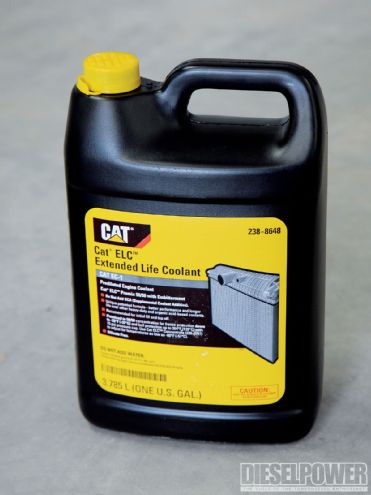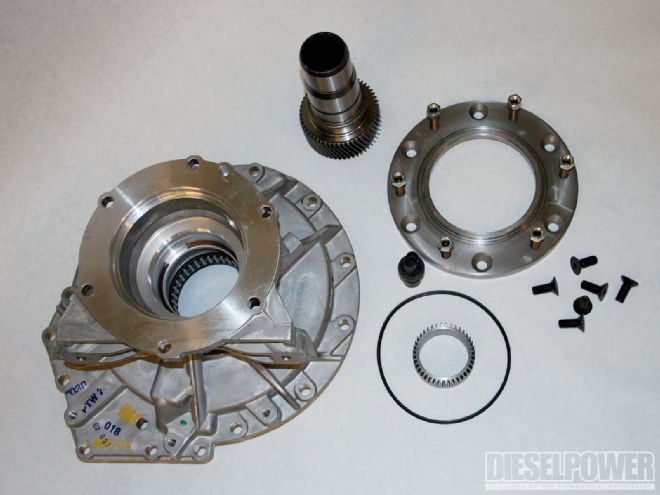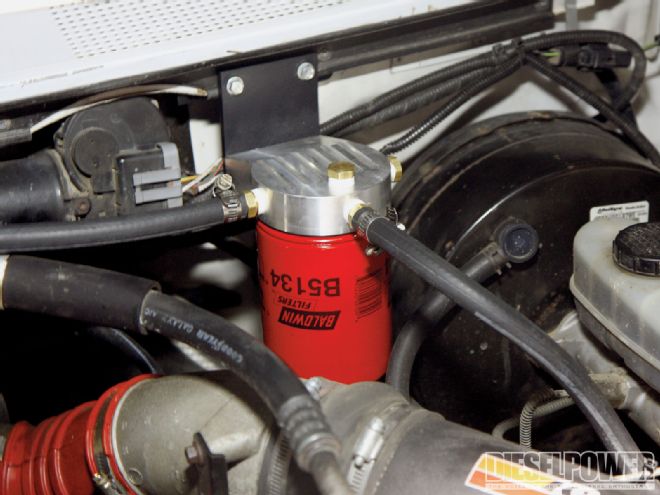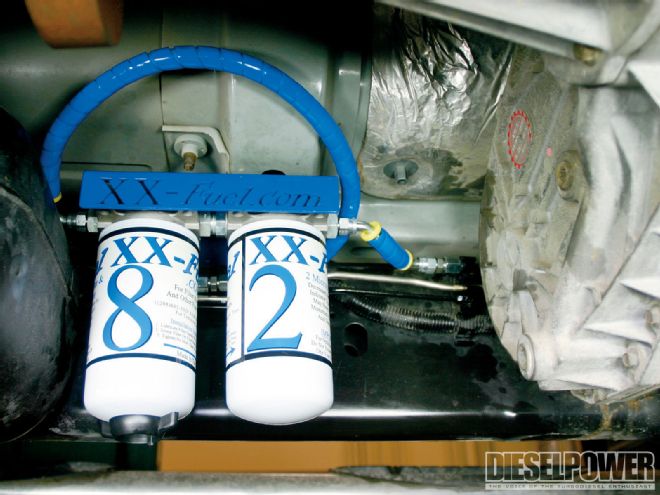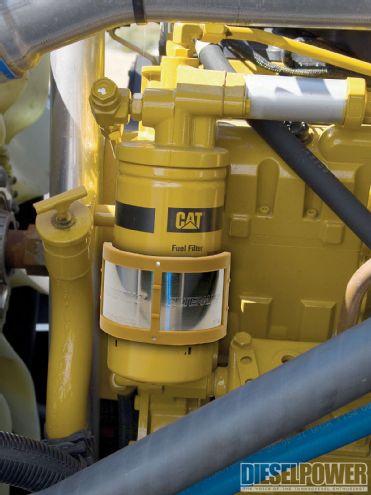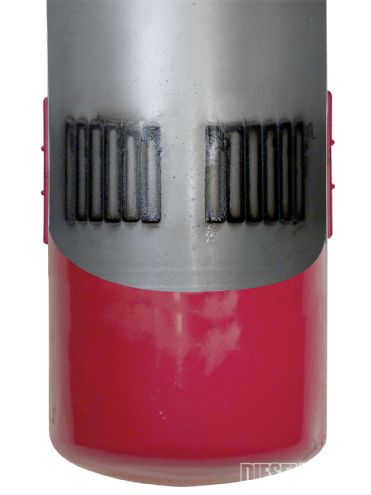The key to million-mile diesel engine longevity is clean and temperature-regulated fluids. That means you need to protect your engine's intake air, coolant, fuel, and oil. Oftentimes, when diesel enthusiasts need to solve a problem like this, we look to our older brothers (the industrial industry) for guidance because they already know what it takes to go the distance. Many of the products and services that make their way to your diesel truck (including the engine itself) were born in the military, mining, and aerospace wombs. Because of that, we want to give you a look at various heavy-maintenance practices and innovative products designed to extend your engine's life.

| A Filter Minder helps save money, since you no longer need to guess when you need a new filter. This device measures vacuum and records the highest level with the yellow indicator moving on the graduated cylinder. The red line means it's time for a filter change, and the button is pressed to reset. The company claims the 6,000-mile air filter change is a myth, and a typical filter is good for 60,000 to 100,000 miles. Just because a filter looks dirty doesn't mean it needs replacing, because the dirt actually creates smaller passageways-increasing the effectiveness of the filter.
Clean And Cool Air
It is extremely important that a diesel engine ingest clean air from the atmosphere. Make sure the intake plumbing is sealed properly and the filter is functioning. A Filter Minder is a handy device that measures restriction and lets you know when it's time to replace (or clean) your filter element. They come in either mechanical or electronic versions, and both can be remote-mounted to your dash for monitoring. It's a good idea to inspect your air filtration system after driving through extreme conditions, because if dirt gets into your engine, it turns into a super-hard abrasive, which will wear down moving parts.
Cold-air intakes, intercoolers, and water-injection systems are all designed to reduce the temperature of the incoming air, and thereby increase its density. Colder air coming into the engine means lower temperatures during combustion, and less EGT on the way out. On the other hand, when it gets extremely cold outside, a radiator blanket should be used to limit the amount of air coming into the grille. This helps the engine warm up faster.
A future solution might include a variable-geometry front grille and adjustable lower air dam-both controlled by a thermostat and actuators-to increase efficiency and aerodynamics while making the engine last longer.
Clean And Warm Coolant
Coolant filters protect big, expensive, industrial diesel engines, but pickup truck diesels were stripped of this technology because of economics. With the price of a new diesel truck now in the $50,000 to $70,000 range-the cost associated with coolant filters seems tiny in comparison. Contaminated cooling systems can wreak havoc on EGR coolers, water pumps, engine blocks and heads, head gaskets, and injectors.
The other thing that'll keep your engine running longer is preheated coolant. The more cold-starts your diesel is subjected to, the shorter its lifespan will be. Inconsistent metal expansion and poor-flowing (thick) lubricants don't provide protection from moving parts. Another thing to worry about is fuel washing the cylinder walls before compression ignition can occur. Hotstart offers electric heaters that circulate warm coolant through the entire engine, which reduces emissions, fuel consumption, and engine wear. Its external tank-style heaters are thermostatically controlled and use a process called thermo-siphon instead of a pump to move the heated coolant, which eliminates the need for idling to keep the engine at its proper temperature. Imagine hopping into your truck on a cold winter morning and the heater is already blowing air from your 140-degree coolant. Hotstart also carries the traditional immersion elements that go in the block and rely on a less efficient convection process with little circulation to warm the coolant. Still, these elements are adequate for most people and have a proven performance record. Speaking of coolant, choosing the right product is crucial to longevity. Extended-life coolants (ELC) eliminate the need for supplemental coolant additives, extend coolant change-out intervals, and reduce disposal costs.
Clean And Cool Fuel
Clean fuel is an important aspect of keeping your expensive injection equipment functioning and alive. AirDog, FASS, XX-Fuel, and many other companies offer fuel systems that eliminate air, dirt, and water from going into the engine. Some people use magnets on their fuel filters to keep out ferrous particles. Filter Minder offers fuel filter indicators that monitor restriction and tell you when it's time for a change. A filter that removes dirt particles down to 2 or 3 microns is one of the best modifications you can make for longevity, especially for newer common-rail engines.

| Forrest Cunningham recently sent us an update that his '01 Dodge Ram 3500 with a 5.9L Cummins just reached 1,639,680 miles. For an in-depth look, check out our coverage in "The Eternal Diesel Truck," July '09.
As far as temperature goes, cool fuel would seem to be best (because it is the most energy dense). But common-rail piezo-injected engines seem to be designed to work with heated fuel. Filter, line, or tank heaters are sometimes used to keep fuel from jelling in arctic climates. And in other cases, fuel coolers are used on the return line to keep fuel temperature under control when the diesel is used to cool the pumps or electronics. The key is to keep the fuel temperatures consistent.
Clean And Warm Oil
Engine oil is the lifeblood of a diesel, and it's what keeps the machine working for you. Fully synthetic oils, like Amsoil, offer the best defense against engine wear, and adding them is the easiest way to increase the life of your engine. Another life-saving tip is to add super-strong rare earth magnets to the side of the factory oil filter. FilterMag offers wraparound magnets that fit 2 1/2- to 5 1/2-inch-diameter oil filter housings. You can cut your filter apart and inspect for signs of engine damage in the form of chunks of metal. Installing a bypass oil filtration system from Amsoil or Filtration Solutions is the next easiest way to extract contaminants from your engine. These work by filtering a little oil at a time (to remove particles down to 1 micron) and returning the filtered fluid back to the system. The Filter Manufacturers Council publishes information on the ISO 16889 test procedure and SAE Oil Filter Test Procedure (ISBN: 978-0-7680-2155-4) for comparing different oil filters. Centrifuges, along with traditional filters, are another step in removing impurities from fluids. This idea is straight from heavy industry and involves a spinning rotor powered by the oil's pressure to create a force able to separate contaminants from the engine oil.
As bad as dirty oil is, cold oil at start-up reduces engine life as well. Hotstart offers engine oil heaters that install in the oil pan. Warming the oil before start-up would definitely benefit Power Stroke owners with HEUI injection.
Many of you are already familiar with the practice of letting your engine cool off before you shut it down. There are now devices designed to keep your engine running after you remove the key from the ignition. These turbo timers keep your turbo (and therefore your engine) alive by allowing the engine to continue to circulate oil until it cools off. This prevents hot oil from literally baking onto hot turbo components, which can form a carbon deposit that destroys turbo bearings.
